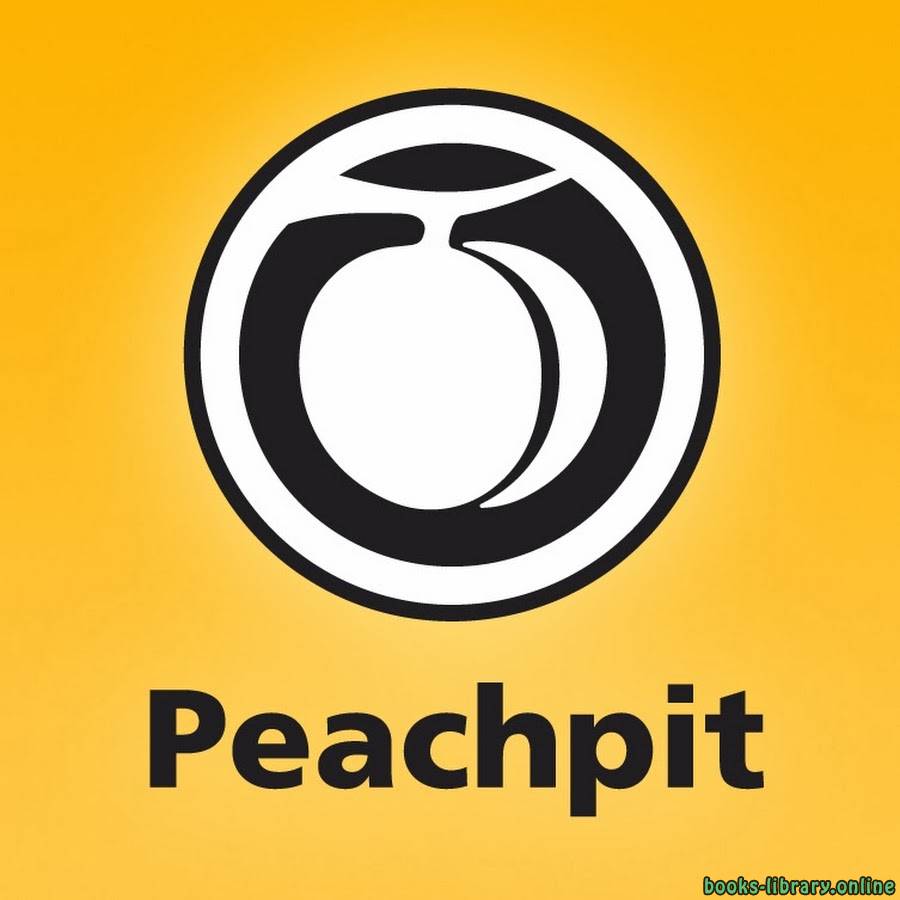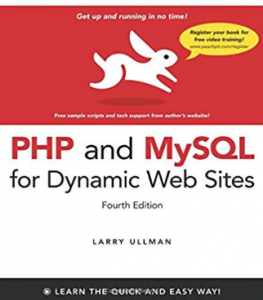📘 قراءة كتاب PHP and MySQL for Dynamic Web Sites 4th Edition أونلاين


وصف عن الكتاب:
لم يستغرق مطورو الويب وقتًا طويلاً ليكتشفوا أنه عندما يتعلق الأمر بإنشاء مواقع ويب ديناميكية قائمة على قواعد البيانات ، فإن MySQL و PHP يوفران مزيجًا ناجحًا مفتوح المصدر. أضف هذا الكتاب إلى هذا المزيج ، ولا يوجد حد لمواقع الويب القوية والتفاعلية التي يمكن للمطورين إنشاؤها. من خلال الإرشادات خطوة بخطوة ، والنصوص الكاملة ، ونصائح الخبراء لتوجيه القراء ، يتجه المؤلف المخضرم ومصمم قواعد البيانات لاري أولمان مباشرة إلى العمل: بعد تأريض القراء بمناقشات منفصلة حول لغة البرمجة النصية (PHP) أولاً ثم برنامج قاعدة البيانات (MySQL) ،
يتابع تغطية الأمان والجلسات وملفات تعريف الارتباط ، ويستخدم أدوات ويب إضافية ، مع عدة أقسام مخصصة لإنشاء نماذج من التطبيقات. هذا الدليل لا غنى عنه لمصممي الويب من المستوى المبتدئ إلى المتوسط الذين يرغبون في استبدال مواقعهم الثابتة بشيء ديناميكي. في هذا الإصدار ، يغطي الجزء الأكبر من المواد الجديدة أحدث الميزات والتقنيات باستخدام PHP و MySQL. جديد أيضًا في هذا الإصدار فصول تقدم jQuery وتقنيات البرمجة الشيئية.
من المؤلف:
شكرا لاهتمامك بهذا الكتاب. فقط للتوضيح ، اعتبارًا من أكتوبر 2011 ، هذا الكتاب ، الإصدار الرابع ، هو أحدث إصدار من كتابي الشهير "PHP و MySQL لمواقع الويب الديناميكية: Visual QuickPro Guide". هذا الإصدار أكثر حداثة من "PHP 6 و MySQL 5 لمواقع الويب الديناميكية" (لإيجاز قصة طويلة ، كان PHP6 في مرحلة تجريبية عندما كتبت هذا الإصدار ، ثم فشل PHP6 في الحدوث ، مع انتهاء معظم تغييراته في PHP5.3 و 5.4).
تم تحديث محتويات هذا الإصدار بالكامل لتتوافق مع الإصدار 5.3 من PHP والإصدار 5.5 من MySQL. ما يقرب من 50٪ من المواد تتطلب الإصدار 5 أو أحدث من PHP ، غالبًا لأن الكتاب يستخدم فقط وظائف MySQL المحسنة ، المضافة في PHP 5 و MySQL 4.1. تتطلب نسبة 10٪ أخرى أو نحو ذلك من المادة الإصدار 5.3 من PHP ، على الرغم من أنني في هذه الحالات ، أقدم رمزًا بديلاً للإصدارات السابقة من اللغة.
من حيث الجديد ، هناك ثلاثة فصول جديدة تمامًا. الفصل 6: تصميم قاعدة البيانات يأخذ بعض المواد من فصلين في الإصدار السابق ، ويقسمها إلى خطوات أصغر ، ويخلق مناقشة أكثر تماسكًا لكل جانب رئيسي من جوانب تصميم قاعدة البيانات. الفصل 15: تقديم jQuery جديد تمامًا ، حيث يقدم JavaScript وإطار عمل jQuery.
تتضمن الأمثلة التحقق من صحة النموذج ومعالجة الأحداث و Ajax. الفصل 16: يعد OOP Primer جديدًا تمامًا ، حيث يناقش أساسيات البرمجة الموجهة للكائنات في PHP. ينصب التركيز حقًا على الأفكار الأساسية والنحو ، باستخدام الفئات الموجودة (يتطلب تصميم ونظرية OOP عددًا كبيرًا جدًا من الصفحات لتناسب هذا الكتاب).
فيما يتعلق بالمحتوى المنقح ، ينتهي كل فصل الآن بقسم "المراجعة والمتابعة" الذي يطرح أسئلة تشدد على النقاط الرئيسية ويقدم مطالبات لكيفية التوسع في المعلومات التي تعلمتها للتو. تستخدم بعض الفصول أمثلة جديدة ، غالبًا لأنني كنت أشعر بالملل من الأمثلة الموجودة. الفصل 7: قام SQL و MySQL المتقدمان بتوسيع نطاق تغطية JOINs ، وقسمًا جديدًا عن التحديدات المتقدمة والمزيد. في الواقع ، كان تحديث وتوسيع محتوى MySQL و SQL تغييرًا رئيسيًا في هذا الإصدار. الفصل 11: تمت إعادة كتابة تطوير تطبيقات الويب بشكل كبير ، مع التركيز بشكل أكبر على استخدام JavaScript في التطبيق النموذجي الذي تم تطويره جزئيًا في هذا الفصل. يحتوي الفصل 13: أساليب الأمان على مثالين جديدين للأمان:
استخدام امتداد المرشح والتحقق من صحة عمليات تحميل الملفات حسب النوع. أخيرًا ، الملحق أ: التثبيت يحتوي على قسم جديد في تكوين خادم Apache. لتوفير مساحة ، يتم توفير الملحق مجانًا عبر الإنترنت من ناشر الكتاب ، Peachpit Press.
From the Author
Thanks for your interest in this book. Just to be clear, as of October 2011, this book, the fourth edition, is the most current version of my popular "PHP and MySQL for Dynamic Web Sites: Visual QuickPro Guide" book. This edition is more current than "PHP 6 and MySQL 5 for Dynamic Web Sites" (to make a long story short, PHP6 was in beta when I wrote that edition, and then PHP6 failed to happen, with most of its changes ending up in PHP5.3 and 5.4).
The entire contents of this edition of the book were updated to correspond to version 5.3 of PHP and version 5.5 of MySQL. Approximately 50% of the material requires version 5 or later of PHP, mostly because the book only uses the Improved MySQL functions, added in PHP 5 and MySQL 4.1. Another 10% or so of the material requires version 5.3 of PHP, although in those instances, I do provide alternative code for earlier versions of the language.
In terms of what's new, there are three entirely new chapters. Chapter 6: Database Design takes some material out of a couple of chapters in the previous edition, breaks it down into smaller steps, and creates a more cohesive discussion of every key facet of database design. Chapter 15: Introducing jQuery is entirely new, introducing JavaScript and the jQuery framework. The examples include form validation, event handling, and Ajax. Chapter 16: An OOP Primer is also entirely new, discussing the basics of object-oriented programming in PHP. The focus is really on basic ideas and syntax, using existing classes (OOP design and theory requires too many pages to fit into this book).
In terms of revised content, every chapter now ends with a "Review and Pursue" section which asks questions that stress key points and provides prompts for how you can expand upon the information you just learned. A few chapters use new examples, mostly because I was bored with the existing ones. Chapter 7: Advanced SQL and MySQL has expanded coverage of JOINs, a new section on advanced selections, and more. In fact, updating and expanding the MySQL and SQL content was a key change in this edition. Chapter 11: Web Application Development is heavily rewritten, putting more emphasis on the use of JavaScript in the example application partially developed in that chapter. Chapter 13: Security Methods has two new security examples: using the Filter extension and validating file uploads by type. Finally, Appendix A: Installation has a new section on Apache server configuration. To save space, the Appendix is being made available for free online from the book's publisher, Peachpit Press.
To address another common question, I consider this book to be more advanced than my "PHP for the Web: Visual QuickStart Guide". Both books cover some of the same material, but this book is for those with some previous programming experience, or those that are good at learning independently. In short, this book goes at a quicker pace and covers a lot more material. If you want something that is more deliberate, but not as big in scope, I would recommend the "PHP for the Web: Visual QuickStart Guide" instead.
Finally, you can download all the scripts from my Web site. I also run a support forum where you can ask questions and get help. Secondary and supporting articles are also published on my Web site, and at the publisher's site. Thanks again for the interest in the book!
سنة النشر : 2014م / 1435هـ .
نوع الكتاب : pdf.
عداد القراءة:
اذا اعجبك الكتاب فضلاً اضغط على أعجبني و يمكنك تحميله من هنا:

شكرًا لمساهمتكم
شكراً لمساهمتكم معنا في الإرتقاء بمستوى المكتبة ، يمكنكم االتبليغ عن اخطاء او سوء اختيار للكتب وتصنيفها ومحتواها ، أو كتاب يُمنع نشره ، او محمي بحقوق طبع ونشر ، فضلاً قم بالتبليغ عن الكتاب المُخالف:
 قبل تحميل الكتاب ..
قبل تحميل الكتاب ..
يجب ان يتوفر لديكم برنامج تشغيل وقراءة ملفات pdf
يمكن تحميلة من هنا 'http://get.adobe.com/reader/'
شركة Peachpit
 نبذة قصيرة عن الناشر: Peachpit هي ناشر للكتب التي تركز على التصميم الجرافيكي وتصميم الويب والتطوير. شركة Peachpit الأم هي Pearson Education ، التي تمتلك علامات تجارية إضافية لوسائل الإعلام التعليمية بما في ذلك Addison-Wesley و Prentice Hall و New Riders. تأسست Peachpit في عام 1986 ، وتنشر دليل البدء السريع Visual ، و Visual QuickPro Guide ، و Classroom في سلسلة كتاب ، بالإضافة إلى بصمة التصميم New Riders وسلسلة Voices That Matter. Peachpit هي الشريك الرسمي للنشر لـ Adobe Systems و Lynda.com و Apple Certified at Apple Inc وغيرها من الشركات التقنية. ❰ ناشرين لمجموعة من المؤلفات أبرزها ❞ PHP and MySQL for Dynamic Web Sites 4th Edition ❝ ❞ PHP6 and MySQL5 ❝ ❞ PHP and MySQL for Dynamic Web Sites 5th Edition ❝ ومن أبرز المؤلفين : ❞ لاري أولمان ❝ ❱. المزيد.. كتب شركة Peachpit
نبذة قصيرة عن الناشر: Peachpit هي ناشر للكتب التي تركز على التصميم الجرافيكي وتصميم الويب والتطوير. شركة Peachpit الأم هي Pearson Education ، التي تمتلك علامات تجارية إضافية لوسائل الإعلام التعليمية بما في ذلك Addison-Wesley و Prentice Hall و New Riders. تأسست Peachpit في عام 1986 ، وتنشر دليل البدء السريع Visual ، و Visual QuickPro Guide ، و Classroom في سلسلة كتاب ، بالإضافة إلى بصمة التصميم New Riders وسلسلة Voices That Matter. Peachpit هي الشريك الرسمي للنشر لـ Adobe Systems و Lynda.com و Apple Certified at Apple Inc وغيرها من الشركات التقنية. ❰ ناشرين لمجموعة من المؤلفات أبرزها ❞ PHP and MySQL for Dynamic Web Sites 4th Edition ❝ ❞ PHP6 and MySQL5 ❝ ❞ PHP and MySQL for Dynamic Web Sites 5th Edition ❝ ومن أبرز المؤلفين : ❞ لاري أولمان ❝ ❱. المزيد.. كتب شركة Peachpit 

 منصّة المكتبة
منصّة المكتبة 